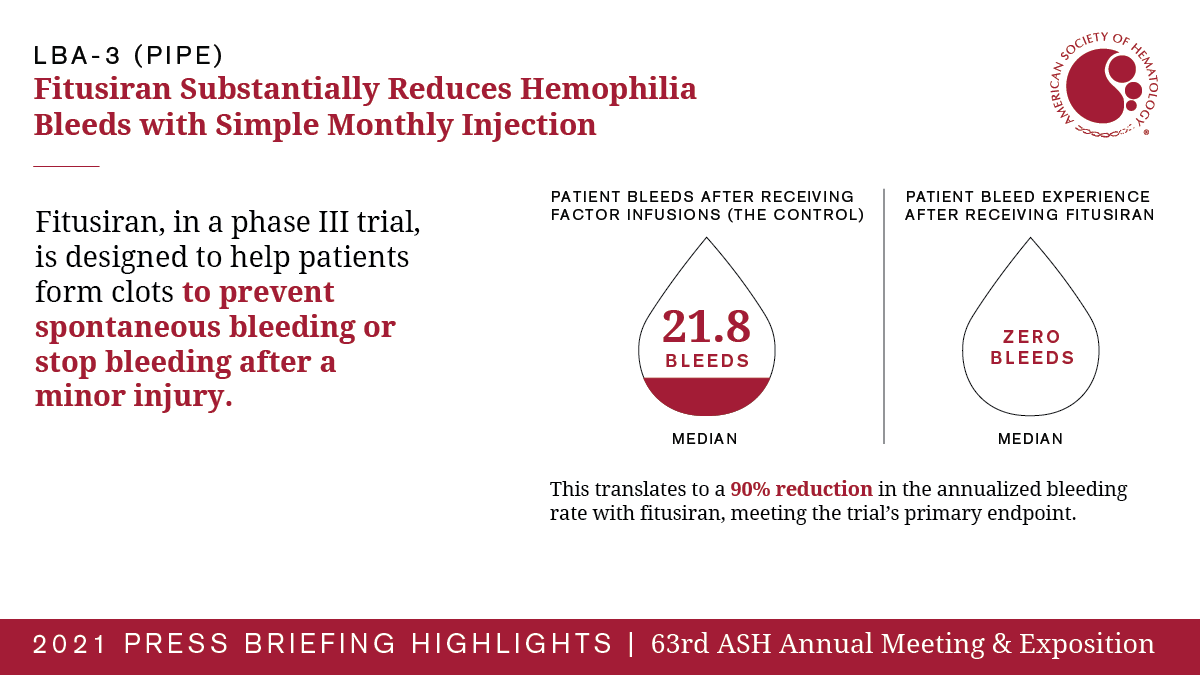Fitusiran Substantially Reduces Hemophilia Bleeds with Simple Monthly Injection
Study in ASH Late-Breaking Abstracts session may offer patients with severe hemophilia an improved quality of life
(WASHINGTON, Dec. 14, 2021) – Fitusiran, an experimental hemophilia therapy administered through a monthly subcutaneous injection, met its primary endpoint in a phase III trial being presented at the 63rd American Society of Hematology (ASH) Annual Meeting and Exposition. The drug dramatically reduced bleeding events, with half of those receiving it experiencing no bleeds and 85% experiencing an annualized bleed rate of three or fewer bleeds over the study period of about eight months.
Fitusiran is designed to maintain a steady level of the drug starting about four weeks after initiation, thus helping patients form clots (maintain hemostasis) to prevent spontaneous bleeding or stop bleeding after a minor injury.
“This is a new class of drugs that brings a high level of hemostasis, well beyond what we would have imagined,” said Alok Srivastava, MD, of Christian Medical College in Vellore, India. “The convenience of this drug, and the high proportion of people who have zero or only a few bleeds, suggests we can really make a difference in the quality of life for people with severe hemophilia.”
Hemophilia is a rare blood disorder that reduces a person’s ability to clot blood due to a deficiency of FVIII or FIX clotting factors. It can cause serious and debilitating symptoms such as severe pain and uncontrolled bleeding (mostly in joints), and lead to early degeneration of the joints. Standard treatment consists of frequent intravenous infusions of blood clotting factors to prevent bleeds. While this treatment has greatly improved the outlook for people with hemophilia, patients must still be cautious to avoid contact sports that could cause bleeding when their factor levels are low. Nearly a quarter of patients develop inhibitors that counteract the infused clotting factors, a serious complication.
Small interfering RNA (siRNA) therapies are a new class of drugs designed to interfere with the production of specific proteins. Fitusiran, the first siRNA developed for hemophilia, targets antithrombin, a protein that reduces blood clotting, in order to increase clotting ability. Given this mechanism, fitusiran is the first drug for hemophilia which is effective in both FVIII and FIX deficiency even with inhibitors.
For the phase III trial, researchers across 19 countries enrolled 120 males aged 12 or older with severe hemophilia A or B. None of the patients had clotting factor inhibitors and all experienced frequent bleeding on the episodic or on-demand treatment regimen for bleeds that they were following before the study. Two-thirds of participants were randomly assigned to receive fitusiran injections once a month along with factor infusions when needed. The remaining patients continued to receive factor infusions when needed. After the study period ended, these patients could cross over to receive fitusiran.
During the study period, those receiving fitusiran experienced a median of zero bleeds while those in the control group experienced a median of 21.8 bleeds. This translates to a 90% reduction in the annualized bleeding rate with fitusiran, meeting the trial’s primary endpoint.
Participants taking fitusiran also reported a significant improvement in quality of life, which researchers attributed to the reduced frequency of bleeding events and reduced need for disruptive and time-consuming factor infusions and hospital visits.
“With a monthly medication, hemophilia becomes easier to treat,” said Dr. Srivastava. “You can reduce the number of times you have to receive intravenous injections, and the steady blood level of the drug means you can feel safer being more active and perhaps a little less fearful of bleeding in your daily activities.”
Among participants receiving fitusiran, 78.5% experienced adverse events compared with 45% of those in the control group. Fitusiran was associated with an increased rate of elevated liver enzymes, gallbladder inflammation and gallstones, and upper respiratory symptoms, most of which were mild and reversible.
Additional studies are underway to help determine the optimal dosing and frequency for the drug. Dr. Srivastava suggested future studies would also be aimed at guiding the management of special situations such as surgery or trauma in patients taking fitusiran.
The trial was funded by Sanofi, developer of fitusiran.
Alok Srivastava, MD, Christian Medical College, Vellore, India will present this study during an oral presentation on Tuesday, December 14, at 9:00 a.m. Eastern time in Hall C2-C3.
Press Briefing Highlights

Additional press briefings took place throughout the meeting on immunotherapy, new insights into blood disorders, COVID-19, and diversifying care in acute leukemia. For the complete annual meeting program and abstracts, visit www.hematology.org/annual-meeting. Follow ASH and #ASH21 on Twitter, Instagram, LinkedIn, and Facebook for the most up-to-date information about the 2021 ASH Annual Meeting.
The American Society of Hematology (ASH) (www.hematology.org) is the world’s largest professional society of hematologists dedicated to furthering the understanding, diagnosis, treatment, and prevention of disorders affecting the blood. For more than 60 years, the Society has led the development of hematology as a discipline by promoting research, patient care, education, training, and advocacy in hematology. ASH publishes Blood (www.bloodjournal.org), the most cited peer-reviewed publication in the field, and Blood Advances (www.bloodadvances.org), an online, peer-reviewed open-access journal.
Contact:
Leah Enser, American Society of Hematology
[email protected], 202-552-4927